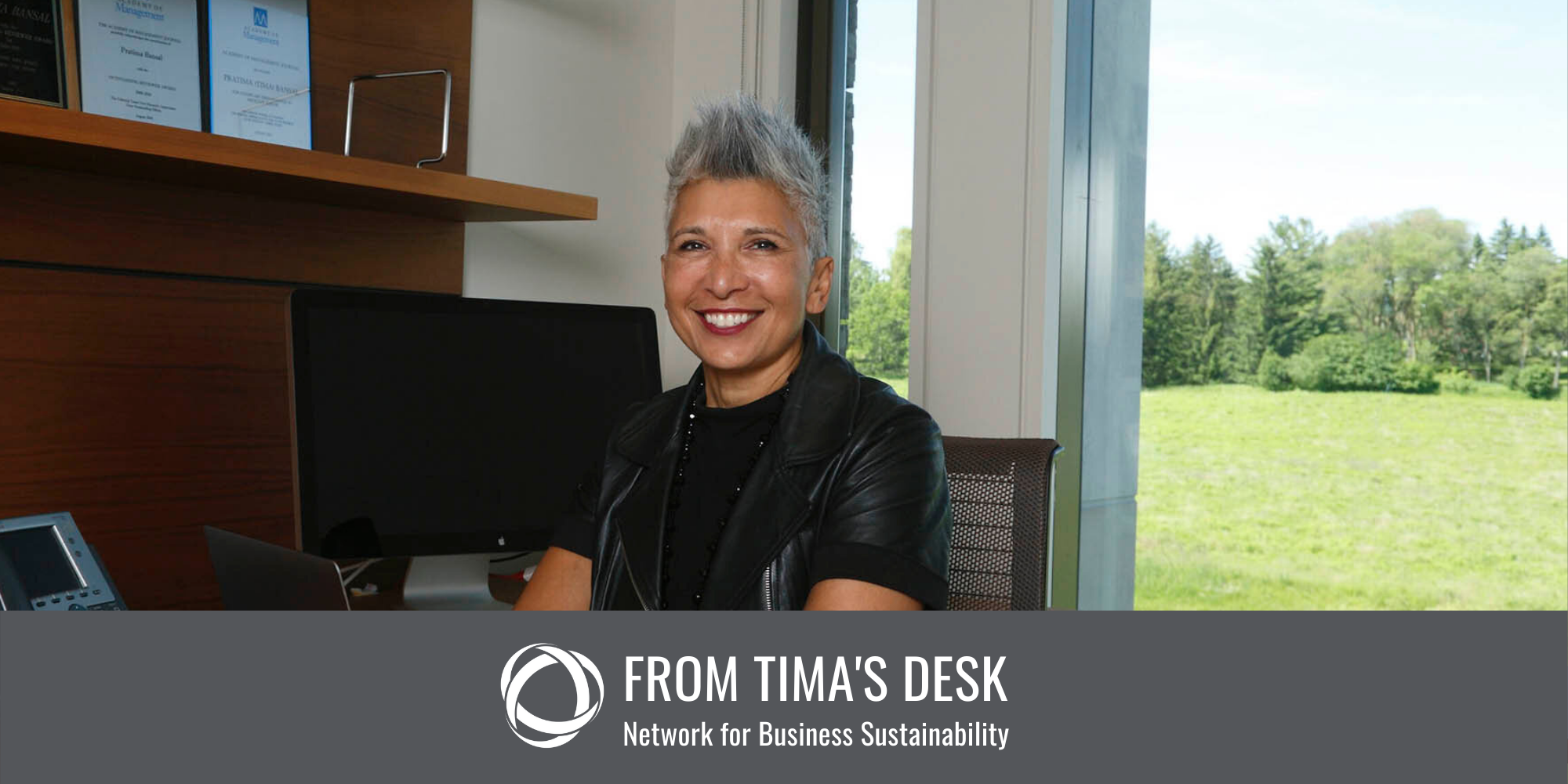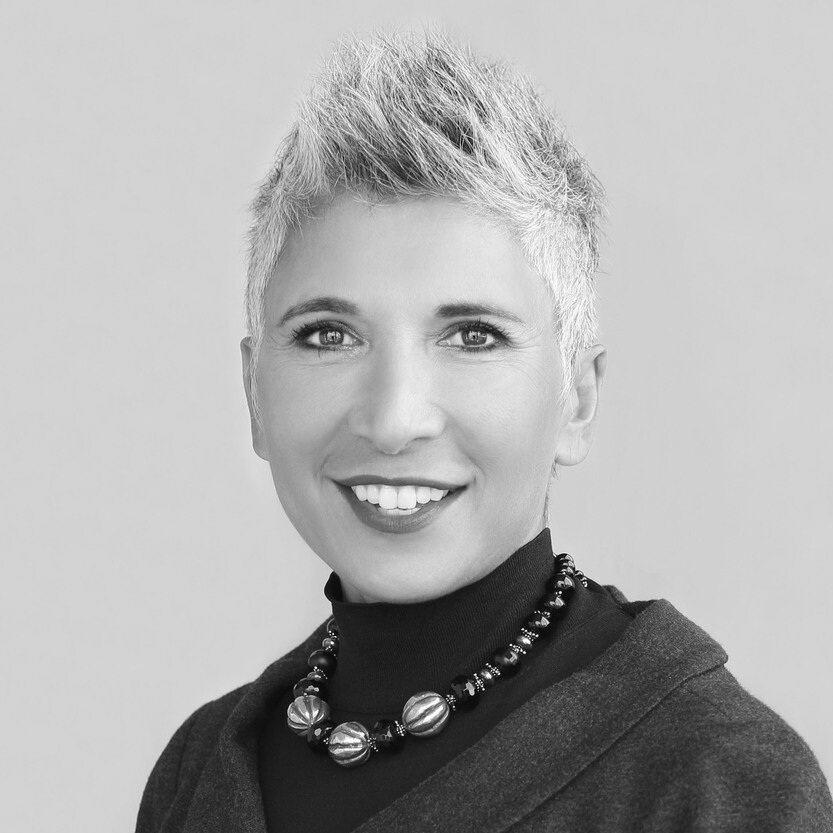Businesses often seek to scale up, but COVID-19 has given us the opportunity to think about scaling down and deep.
Dr. Tima Bansal is Founder of the Network for Business Sustainability.
Soon after World War II ended, Sir Winston Churchill advocated the creation of the United Nations by claiming that one should “never let a good crisis go to waste.”[1]
We are in the middle of another crisis, brought on by COVID-19. There has been much talk about a ‘clean reset’ and ‘building back better’: creating a more sustainable society. There is little evidence to suggest we have. Yet, I believe that some important changes have been made, even if they have not been fully realized.
COVID-19 initially meant less waste
In March 2020, as countries entered lockdown, pollution fell dramatically. For the first time in decades, Indians living in the northern state of Punjab were able to see the Himalayas. A research team published a study in Nature reporting a 17% decrease in daily CO2 emissions in April 2020, compared to the same time the previous year. COVID-19 offered people a window into a green, clean world.
However, optimism about a green reset was premature. Only two months later, the same researchers published another article showing that CO2 emissions had already increased to almost pre-pandemic levels. In September, The Economist reported the same pattern in another common pollutant, NO2.
We hadn’t built back better; we had built back the same.
Did we waste the crisis?
It’s hard not to lament the lost opportunity. Governments spent trillions of dollars in stimulus money. By July 2020, the US had spent 15% and China had spent 7% of their respective annual GDPs. Yet, the International Institute of Finance claimed that less than 1% of stimulus money worldwide had been spent on a green recovery.
But, I did experience moments of clarity about the future of business. COVID-19 placed into stark relief how global, disconnected, and complex business had become. Even as it created more wealth, pre-COVID business was prompting more consumption and becoming increasingly vulnerable to crises.
During COVID-19, I personally experienced commerce in a new way. I encountered a business world that is more local, more circular, and more agile. This type of business is based on a community economy that can contribute not to global wealth or GDP, but to local resilience.
Permit me to imagine what this might look like in the future.
1. Business becomes more local
Back in March, when the crisis first took hold, I reached out to a friend at nearby YU Ranch. He farms Texas Long Horn cattle sustainably — completely free range, grass fed, antibiotic and hormone-free cattle, with no pesticides or fertilizers on the land. He sells to high-end restaurants and to customers who show up at his farm gate.
Because the restaurants had closed, I was worried that he would have too much stock. He told me that actually he couldn’t keep his freezers stocked, as there was a surge in demand from farm-gate customers looking for local, reliable, safe food.
I also started ordering home delivery of local vegetables, bread, honey and other products. As my neighbors saw the Common Grounds van pull up on Saturdays, they started doing the same.
I now can imagine a world in which locally-made goods are delivered regularly, based on what customers pre-order. This delivery service would allow businesses to better anticipate demand and create less waste. Delivery costs and emissions would be low as the distributors could cover a whole neighborhood. And, such a service would build community, as customers sharing the service connect with the people providing it and with their own neighbors.
2. Business becomes more circular
My neighbors occasionally leave discarded furniture and household items at the front of their yards for others to pick up, with a “take me, I’m free” sign. These items are always gone the next time I pass by. It seems that little goes to a landfill. In recent months, I have seen even more of these items as people are spending more time at home — a used lawn mower, a bookshelf, a couch.
I find this community-based giving and taking inspiring. And I imagine local businesses being more involved in repair, recycling, and re-distribution, which can give more products meaningful second lives.
A global goods market often contributes to a linear, one-direction, take-make-waste economy. In a global system, it is more efficient for goods to go to landfill than to be repaired or redistributed. Most of the goods returned to Amazon end up in landfill, despite being in perfectly good condition,. That’s because of the high costs of restocking in a global economy.
A local economy makes it easier to put a circular economy in practice, although I acknowledge that there are important global efforts at repair and reuse being made by companies like Ikea and Patagonia.
Do you remember the ‘milkman’ (indeed, always a man)? As a child, I loved having fresh milk delivered in the milk chute. My mother rinsed out the old bottles and put them back into the milk chute, to have them replaced by filled bottles. It was magic to a 4-year old. Several decades forward, I am reexperiencing this kind of service through the zero-waste shop that just opened a few kilometers from my house. It will deliver soaps and other non-perishable liquids in reused, sanitized bottles. Once again, it feels like magic.
3. Business becomes more agile
I continue to be amazed at how quickly people adapted to the ‘new normal’ of COVID-19. Within a few weeks, we were teaching, learning and meeting on line. Business people shifted to all forms of digital communications, including Zoom, Webex, Microsoft Teams, and Google Meets. I now move seamlessly across email, messaging, Facetime, WhatsApp, and even the telephone. At first, I was overwhelmed with the options; now, I don’t even notice. I can choose to work at my home office, my back yard, or at my business school — depending on my current needs.
Resilience — to recover quickly from crisis — requires adaptability and agility. These qualities are particularly necessary in a turbulent world. As supply chains had become more global, yet more interconnected and interdependent, they also became more brittle and exposed to risks. COVID-19 showed not only how much waste there already was in the system, but how much more is wasted when a crisis hits. According to Reuters, an Iowa farmer had to kill 7500 unborn piglets — it’s heart breaking. When people and business become more agile, flexible and adaptable, they waste less, not more.
Let’s Not Waste the Future
COVID-19 ignited local, small, community-based businesses with deeper roots. Google, Apple, Facebook and Netflix seek to scale up, but maybe COVID-19 has given us an opportunity to think about scaling down and deep. COVID-19 could inspire a local, circular, and agile economy that will build resiliency and prosperity.
[1] The quote’s attribution to Churchill is a subject of debate, but the philosophy still holds.
Continuing the Conversation
Where have you seen inspiration through COVID-19? Let’s share these stories, and not let a good crisis go to waste. I encourage you to also visit this article for the UK Association of the United Nations, which speaks to policy implications.
Comment below or feel free to message me (@TimaBansal, tbansal@ivey.ca) or the NBS community (@NBSnet) privately or publicly.
More From Tima’s Desk
Dr. Tima Bansal, NBS’s Founder, regularly shares her observations about business sustainability. Click the button below to see the full series.
For social justice and for human survival, the Indigenous worldview needs to become our guide for decisions. Businesses can play a role in this transition.
Business school students want to change their curriculum and the broader world. Let’s talk about how they can do it.
Current approaches to business — and business sustainability — are not working. Companies need a business model focused not only on profits, but also on waste.




Add a Comment
This site uses User Verification plugin to reduce spam. See how your comment data is processed.This site uses User Verification plugin to reduce spam. See how your comment data is processed.